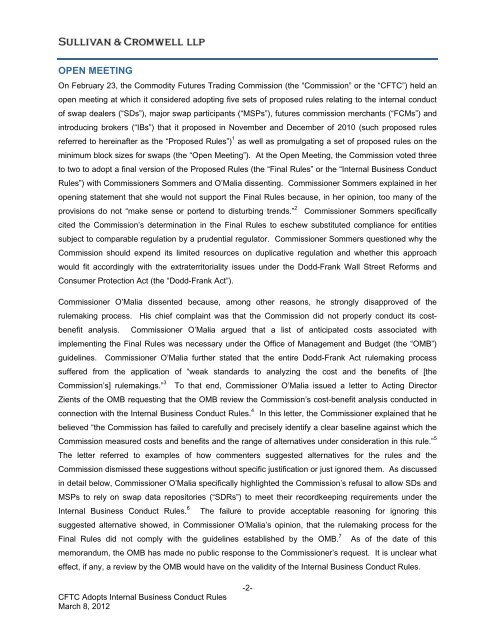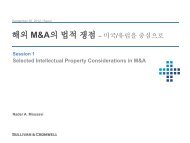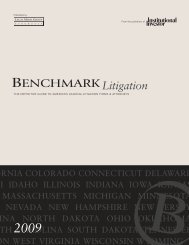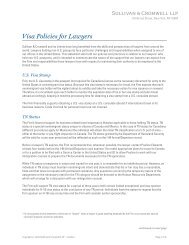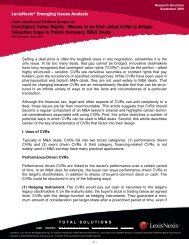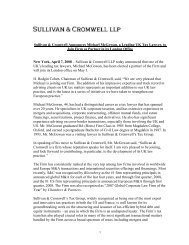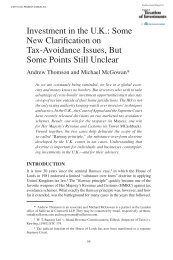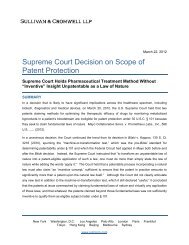CFTC Adopts Internal Business Conduct Rules - Sullivan & Cromwell
CFTC Adopts Internal Business Conduct Rules - Sullivan & Cromwell
CFTC Adopts Internal Business Conduct Rules - Sullivan & Cromwell
Create successful ePaper yourself
Turn your PDF publications into a flip-book with our unique Google optimized e-Paper software.
OPEN MEETING<br />
On February 23, the Commodity Futures Trading Commission (the “Commission” or the “<strong>CFTC</strong>”) held an<br />
open meeting at which it considered adopting five sets of proposed rules relating to the internal conduct<br />
of swap dealers (“SDs”), major swap participants (“MSPs”), futures commission merchants (“FCMs”) and<br />
introducing brokers (“IBs”) that it proposed in November and December of 2010 (such proposed rules<br />
referred to hereinafter as the “Proposed <strong>Rules</strong>”) 1 as well as promulgating a set of proposed rules on the<br />
minimum block sizes for swaps (the “Open Meeting”). At the Open Meeting, the Commission voted three<br />
to two to adopt a final version of the Proposed <strong>Rules</strong> (the “Final <strong>Rules</strong>” or the “<strong>Internal</strong> <strong>Business</strong> <strong>Conduct</strong><br />
<strong>Rules</strong>”) with Commissioners Sommers and O’Malia dissenting. Commissioner Sommers explained in her<br />
opening statement that she would not support the Final <strong>Rules</strong> because, in her opinion, too many of the<br />
provisions do not “make sense or portend to disturbing trends.” 2 Commissioner Sommers specifically<br />
cited the Commission’s determination in the Final <strong>Rules</strong> to eschew substituted compliance for entities<br />
subject to comparable regulation by a prudential regulator. Commissioner Sommers questioned why the<br />
Commission should expend its limited resources on duplicative regulation and whether this approach<br />
would fit accordingly with the extraterritoriality issues under the Dodd-Frank Wall Street Reforms and<br />
Consumer Protection Act (the “Dodd-Frank Act”).<br />
Commissioner O’Malia dissented because, among other reasons, he strongly disapproved of the<br />
rulemaking process. His chief complaint was that the Commission did not properly conduct its costbenefit<br />
analysis. Commissioner O’Malia argued that a list of anticipated costs associated with<br />
implementing the Final <strong>Rules</strong> was necessary under the Office of Management and Budget (the “OMB”)<br />
guidelines. Commissioner O’Malia further stated that the entire Dodd-Frank Act rulemaking process<br />
suffered from the application of “weak standards to analyzing the cost and the benefits of [the<br />
Commission’s] rulemakings.” 3 To that end, Commissioner O’Malia issued a letter to Acting Director<br />
Zients of the OMB requesting that the OMB review the Commission’s cost-benefit analysis conducted in<br />
connection with the <strong>Internal</strong> <strong>Business</strong> <strong>Conduct</strong> <strong>Rules</strong>. 4 In this letter, the Commissioner explained that he<br />
believed “the Commission has failed to carefully and precisely identify a clear baseline against which the<br />
Commission measured costs and benefits and the range of alternatives under consideration in this rule.” 5<br />
The letter referred to examples of how commenters suggested alternatives for the rules and the<br />
Commission dismissed these suggestions without specific justification or just ignored them. As discussed<br />
in detail below, Commissioner O’Malia specifically highlighted the Commission’s refusal to allow SDs and<br />
MSPs to rely on swap data repositories (“SDRs”) to meet their recordkeeping requirements under the<br />
<strong>Internal</strong> <strong>Business</strong> <strong>Conduct</strong> <strong>Rules</strong>. 6 The failure to provide acceptable reasoning for ignoring this<br />
suggested alternative showed, in Commissioner O’Malia’s opinion, that the rulemaking process for the<br />
Final <strong>Rules</strong> did not comply with the guidelines established by the OMB. 7 As of the date of this<br />
memorandum, the OMB has made no public response to the Commissioner’s request. It is unclear what<br />
effect, if any, a review by the OMB would have on the validity of the <strong>Internal</strong> <strong>Business</strong> <strong>Conduct</strong> <strong>Rules</strong>.<br />
<strong>CFTC</strong> <strong>Adopts</strong> <strong>Internal</strong> <strong>Business</strong> <strong>Conduct</strong> <strong>Rules</strong><br />
March 8, 2012<br />
-2-


